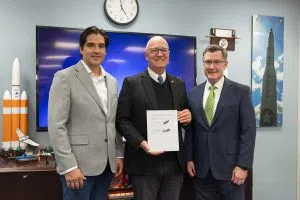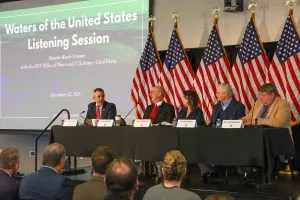 (Jeff Beach – Michael Achterling -North Dakota Monitor) -Advocates for free school lunch and breakfast in North Dakota said Thursday that the Legislature needs to prioritize permanent funding to pay for meals for students for equity, academic and health reasons.
(Jeff Beach – Michael Achterling -North Dakota Monitor) -Advocates for free school lunch and breakfast in North Dakota said Thursday that the Legislature needs to prioritize permanent funding to pay for meals for students for equity, academic and health reasons.
In a press conference, Robin Nelson, CEO of the Boys and Girls Club of Fargo and vice president of the Fargo School Board, estimated the two-year cost of free school meals at $140 million — $110 million for lunches and $30 million for breakfast — for North Dakota students in both public and private schools.
“The time is now to start building the effort to guarantee access to school meals for all students, regardless of income, by implementing a permanent — and I want to emphasize the word permanent — policy for healthy school meals,” Nelson said. “And the only way to achieve this is by action of the North Dakota state Legislature.”
Nelson was joined at the Great Plains Food Bank in Fargo by Melissa Sobolik, the food bank’s CEO, and Tony Burke, government relations director for the American Heart Association.
The Together for Schools Meals effort counts more than 30 organizations in support of the plan.
Sobolik named Rep. Zac Ista, D-Grand Forks, as working on draft legislation but said it would be a bipartisan effort. Republicans hold a supermajority in both houses of the Legislature, which convenes Jan. 7 for the 2025 session.

Ista told the North Dakota Monitor that he knows some Republicans that are crafting a free school meals bill, but, if for some reason the bill isn’t introduced, Ista said North Dakota Democrats would introduce their own bill.
“I’m excited that there’s a group of grassroots supporters out there really driving this conversation,” said Ista, who serves as House minority leader. “We’re hearing from parents, teachers, nutritionists, health care professionals and workers that this is a top priority for them and they see states across the country implementing this.”
A poll conducted in November by the North Dakota News Cooperative showed 82% of North Dakotans approved of more state support for providing free meals for school children.
North Dakota passed two bills related to school meals during the 2023 session.
One was Senate Bill 2284, with $6 million in one-time funding for providing school meals free of charge to students at or below 200% federal poverty level through the end of the 2024-25 school year. A family of four with income below $60,000 will qualify for free meals.
Sobolik said this essentially put students that were in the reduced-fee lunch category into the free lunch program.
The other bill was House Bill 1494, which Nelson described as the “anti-school lunch shaming bill.” It prevented a school from serving an alternative meal for students who didn’t have money in their school meal account.
While that was good for students, schools need more support, she said.
“The untold story is that unpaid debt is absorbed by each school district out of the same accounts that fund teacher salaries, forcing many of us to redirect funds away from the original intent,” Nelson said.
She said the Fargo School District has about $72,000 in school meal debt and projects about $125,000 by the end of the school year.
“School meals for all is a great equalizer, ensuring that every child, regardless of their background, has the resources they need to grow, learn and succeed,” Nelson said.
GET THE MORNING HEADLINES.
Nelson noted that those bills were both temporary funding and called for a way to fund school meals on an ongoing basis.
“If no action is taken during this upcoming session, those benefits will end,” Nelson said.
“Free school meals will free up household resources so they can afford other necessities,” she said.
Sobolik said hunger is a complex issue affected by inflation, a lack of affordable housing, the cost of child care and access to transportation.
Burke said free school meals improve academic performance and would be an investment in the future health of North Dakotans. He said providing healthy meals to children will help combat a rising trend of obesity in the United States.
“The cost to feed children nutritious meals today is less than paying for the medical bills 25 years from now,” he said.
When asked about the possibility of a free school meals program being included in his executive budget recommendation, Gov. Kelly Armstrong said he wants to work through the total cost of property tax reform measures and its effect on the state budget before considering a school meals program.
“Until we know what that number is, it’s really hard to factor in,” Armstrong said.
He’s found himself on every side of the free school meals debate, he said, because he doesn’t think his children, and other families with means, should be taking free meals away from those who really need them.
There also has been discussion in North Dakota about supplementary funding that families using both public and private schools could spend to help expand educational opportunities.
“I’m going to say there is a high probability that there will be funding for private private education with public dollars,” Nelson said. “We feel that providing school meals should be a priority for public dollars over funding private institutions. And I know that sounds like we’re pitting something against the other, but this is a matter of priorities.”









